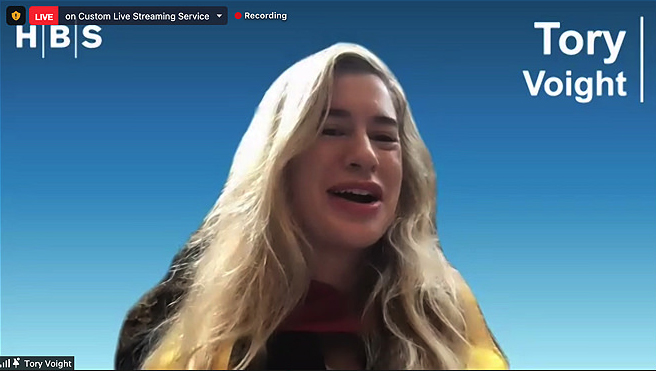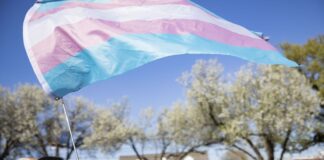Even in a pandemic-driven, online year, Harvard graduation ceremonies have proliferated. Although the main University event this week is the “Honoring the Harvard Class of 2021” program substituting for the full-dress Morning Exercises on Thursday, four separate celebrations have already taken place: an inaugural First-Gen/Next-Gen gathering, on May 23 (for all students “who are first-generation as well as lower-income, undocumented, Dacamented, mixed-status households, and TPS students,” per the Gazette); the inaugural University Lavender Graduation on May 24 (celebrating LGBTQIA+ graduates); and the returning Black and Latinx events today.
The latter two bracketed the venerable Baccalaureate, in the lineup again after a hiatus last spring, during the initial, chaotic disruptions caused by the coronavirus. Given his charge to “impart wisdom,” in this year’s edition, President Lawrence S. Bacow—reflecting on the pandemic and what it cost in personal terms—urged the graduates-to-be, “[D]o not hesitate” to connect with and love fellow human beings.
A report on the graduation celebrations and the Baccalaureate follows.
“Proud of My Whole Self”: The First-Generation/Next Gen Celebration
At the first-ever First Gen/Next Gen graduation ceremony, on May 23, which celebrated students across Harvard who are the first in their family to attend college or come from low-income families, speaker after speaker expressed gratitude for the loved ones who’d helped push them toward this moment and the peers who had helped see them through the barriers they’d faced. Tory Voight, M.B.A. ’21, who grew up helping her single mother clean houses as the youngest of five children, said that at Harvard, she had “finally learned to feel proud of my whole self and my whole identity as a First Gen, to honor it by owning it and to not hide from it, and to help others do so as well.”
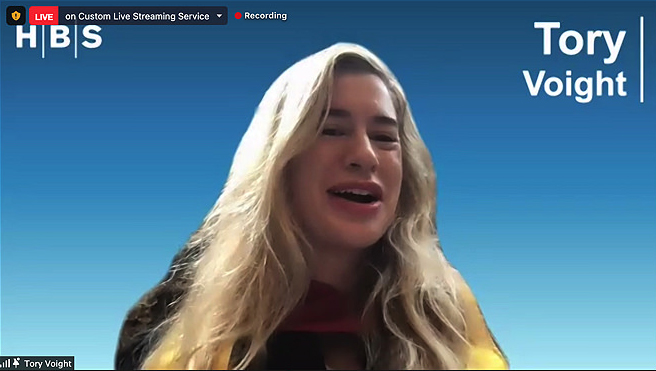
Tory Voight, M.B.A. ’21
Screenshot by Harvard Magazine
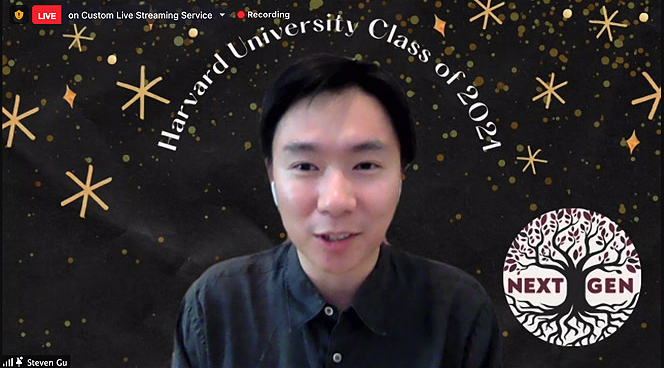
Steven Gu, M.U.P. ’21
Screenshot by Harvard Magazine
Emily Romero Gonzales ’21, a DACA recipient born in Peru who is planning a career in immigration organizing and law, spoke about her momentous four years at the College, a place that “was never built for students like us.” She recalled the obstacles she’d faced on campus and beyond, and the classmates in first-generation, low-income, and undocumented communities who came together “even during the hardest of times,” including last March, when an email from administrators informed undergraduates they’d have to leave campus within five days. Student leaders “worked day and night,” she said, to compile resources for classmates jugging sudden uncertainties about housing, storage, and flights home. “I am filled with pride in our community, and I learned so much from each of you.” Steven Gu, M.U.P. ’21, talked about an unexpected blessing from a school year conducted online: because he was living at home, his parents were able to see with their own eyes what his academic life was like, and to connect with him more deeply. “It really brought Harvard back home in a lot of ways.”
~Lydialyle Gibson
“Our Dear Community”: Lavender Graduation
On Monday evening, at the first Lavender Graduation Ceremony celebrating LGBTQ+ graduates from across the University, things got emotional quickly. After a moment of silence for “our queer ancestors and queer lives lost”—and an acknowledgement of the risk in coming out for some members of what emcee Katie Caponera, assistant director of student services planning at Harvard Divinity School, called “our dear community”—the program turned to an award announced only hours earlier.
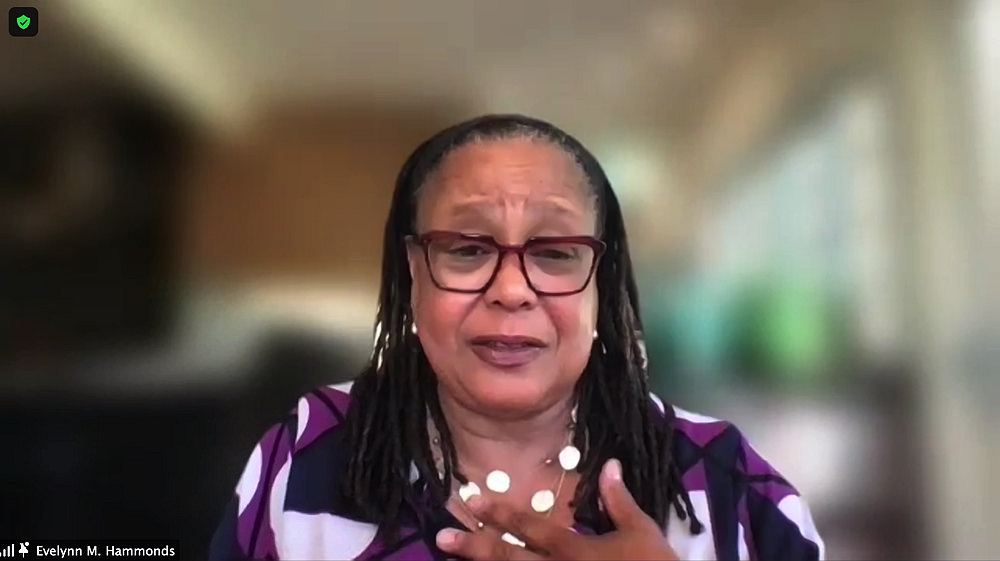
Evelynn M. Hammonds
Screenshot by Harvard Magazine
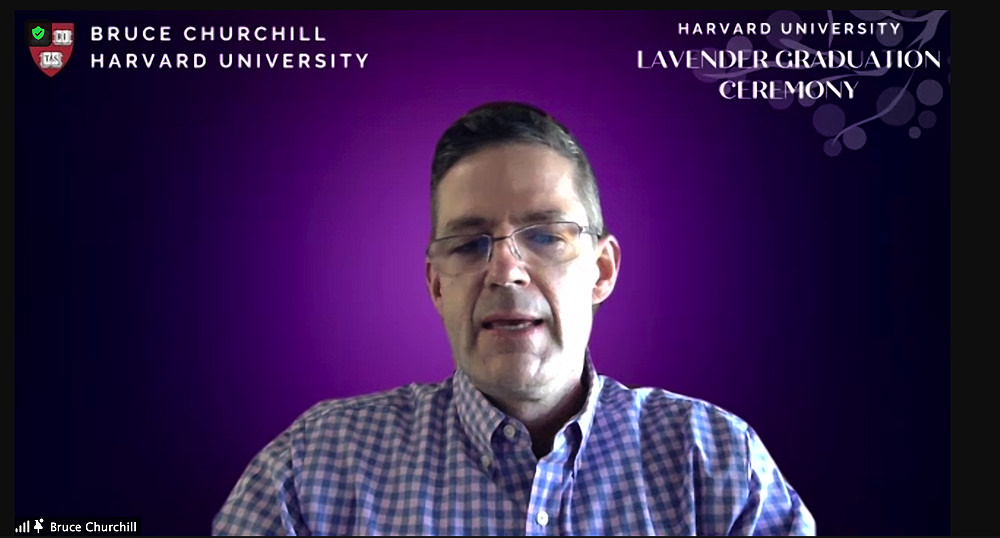
Bruce Churchill
Screenshot by Harvard Magazine
The Evelynn Hammonds Award for Exceptional Service to BGLTQ+ Inclusion (named for the Rosencrantz professor of the history of science and a former dean of the College—the first openly gay African American woman to hold that title) was unveiled. The inaugural recipient was the Harvard University Health Services’ BGLTQ team, which has worked for two decades to improve health care—both physical and mental—for a community that has often been invisible, if not actively rejected and discriminated against, by medical professionals, with sometimes devastating results. “We recognize that this work is never finished,” said HUHS family medicine physician and BGLT team leader Bruce Churchill in accepting the award. Hammonds, who also spoke at Monday’s ceremony, called the award in her name “the greatest honor I have ever received.” Visibly emotional and fighting back tears, she spoke of a lifetime’s struggle to understand and integrate her overlapping stigmatized identities as a black woman and a lesbian, and the gay-rights movement’s long fight—in the streets, in the courts, and on campus—to gain public acceptance in society and at institutions like Harvard. Paraphrasing the queer poet Audre Lorde, Hammonds said, “It is within our differences that we are both most powerful, and most vulnerable. And some of the most difficult tasks of our lives are the claiming of differences and learning to use those differences for bridges, rather than barriers between us.”
~Lydialyle Gibson
“Help Untie the Knot”: Black Graduation Ceremony
The memory of George Floyd—who was killed one year ago today—played a prominent part in the Black Graduation Ceremony, which celebrated African, African American, and black graduates from across the University. “Though we hope to focus today’s program on your celebration, we must acknowledge the indelible mark that Mr. Floyd’s passing had on our people, and on a country continuing to grapple with its relationship with race,” said Yvonne Osirim ’01, J.D. ’07, who emceed the event with Tracy “Ty” Moore II ’06. (Osirim is president of the Harvard Black Alumni Society; Moore serves on the executive committee of the board of directors of the Harvard Alumni Association.)
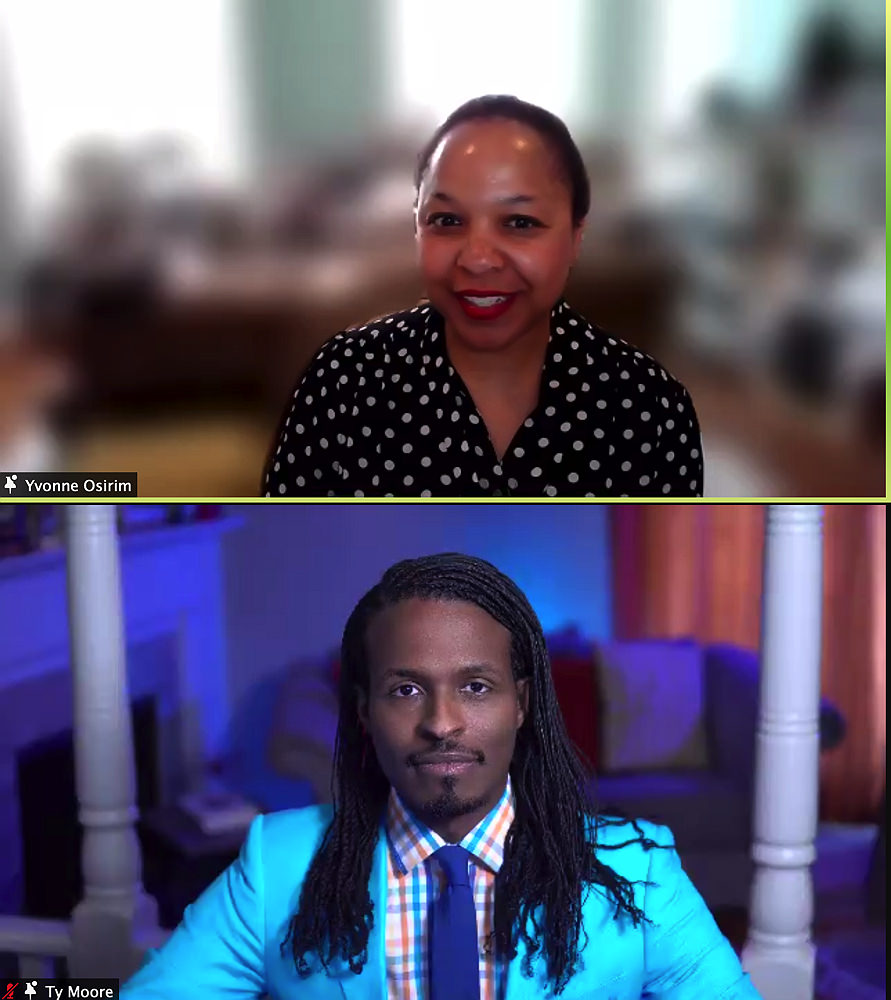
Yvonne Osirim and Ty Moore
Screenshot by Harvard Magazine
The event was at times both reflective and joyous, beginning with an emotional rendition of “Lift Every Voice and Sing,” performed by Shahara Jackson, Ed.L.D. ’21. The performance was followed by a short speech by Tyrell Adeyemi Ed.M ’21, president of the Black Graduate Student Alliance, who urged graduates to remember Floyd and others who have passed, but also to continue pushing through adverse circumstances. “[P]erseverance exists in our DNA,” he said. But “excellence and magic live there, too.”
The event also served as a challenge to graduates to go out and do something about the injustices they observe in the world. “What will we do when we are proximate to power?” asked Samantha Fletcher, Ed.M. ’21. “What will we do when we are in power ourselves?” Journalist and TV host Joy Reid ’91, who served as the event’s keynote speaker, echoed the sentiment. “Black people in this country, from the moment that we set foot on this stolen soil, have forced…America to reckon with its soul, to reckon with what it says that it is,” Reid said. “America cannot claim to be a beacon of liberty until it unties the knot that began around our necks in 1619.…So how will you use your brilliance, your achievement, to help untie the knot and help us all get free?”
~Jacob Sweet
“Leaving Legacies in Their Name”: Latinx Graduation
During the seventh annual Latinx Graduation Ceremony, this afternoon, Claribel Aguilar Whyte, Ed.M ’21, rapped her own version of a Spanish-lyric pop song, including, in part: “The hope that has been passed to us from our students, families, and friends, just tells that our dreaming should never end, but rather it should transcend until it pays out its dividends, not just for monetary gain, but a way for us to remember the pain and the actions we took—to make things change.…We have the blood of courageous people in our veins…people who break chains, when all their hopes and dreams seemed insane, leaving legacies in their name.”
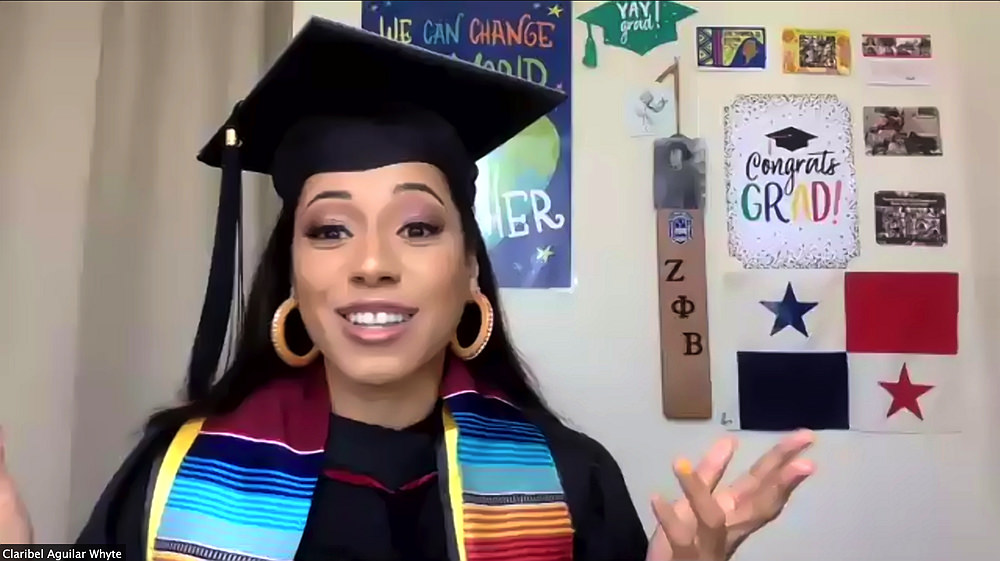
Claribel Aguilar Whyte
Screenshot by Harvard Magazine
In her speech, she also said that “one of the biggest things I learned throughout my time at Harvard is the importance of honoring myself. I’m thankful I was in a space where I could normalize my humanity in class.” She told University-wide classmates, “Today’s your day, you’ve earned it, celebrate yourself. You belonged here. Lastly, I’d like to leave you with a quote from Beyoncé: ‘Shine already, it’s time already.’”
Marcelo Garzo Montalvo, visiting assistant professor of Latinx studies and faculty director of the Latinx Studies Working Group, asked people to take a moment of silence to “give thanks to our ancestors, human, blood-related, and beyond, for making this all possible. Please take a moment to presence them, bring them to mind. If you like, speak their names.”
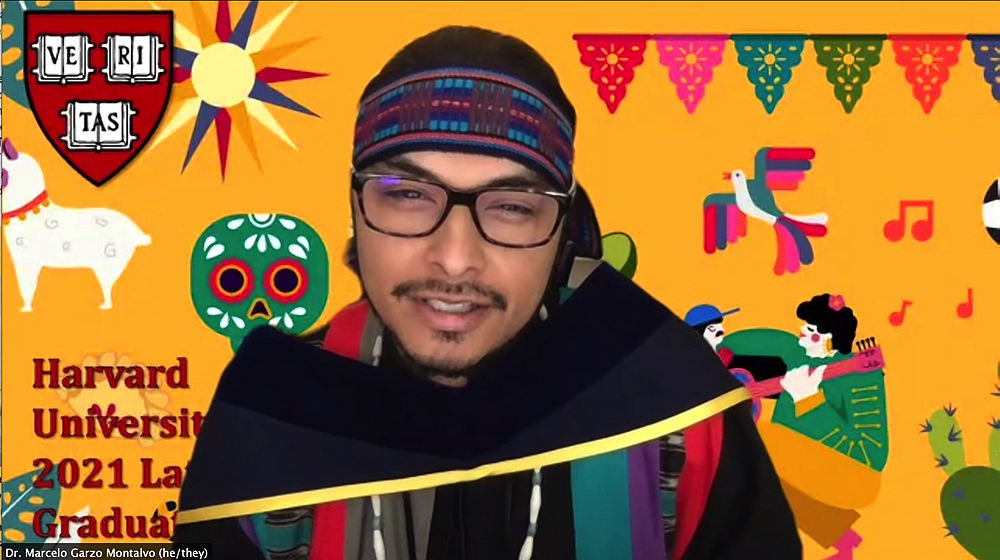
Marcelo Garzo Montalvo
Screenshot by Harvard Magazine
Citing a “year of loss, grief, isolation,” he pointed to the important lesson that “we are profoundly and unequivocally connected. This virus has been a harsh teacher. It’s also in the space of ceremony and reflection that I would like to ask, following the Chinese-American feminist philosopher Grace Lee Boggs…in this time of closing one cycle and beginning another. Ask yourself, what is your purpose here now. There are no coincidences. You are here for a reason.”
~Nell Porter Brown
“Anything but a Typical Year”: The Baccalaureate
In his address to the senior class during the Baccalaureate ceremony—a Harvard tradition since the seventeenth century that was interrupted in 2020—President Bacow said he would not offer “any bromides,” because this was “anything but a typical year.”
“The reality is that some of you have lost loved ones—and have been unable to mourn them surrounded by family and friends. Some of you have struggled—physically and mentally, financially and socially—as the pandemic has unfolded. And all of you,” Bacow said during the audio-only ceremony, which was accompanied by choral music from archival recordings of past services, “have been deprived of the simple joy of being together—and of experiencing your senior year as a class.”
His imperatives to the seniors, therefore—to “connect,” to “love,” to “live”—were a kind of antidote to isolation, with “one thing in common: other people.” He emphasized the importance of understanding others, both “how they see you and how they see the world.” He urged members of the class to maintain their relationships with each other, “so that you can support one another during all of life’s passages….Everything ahead of you will be improved by the company of people who knew you when you were just beginning to figure out who you really are.” And finally, he urged the seniors to “remain open to serendipity…and recognize opportunity when it walks up and hits you in the face—because I guarantee you it will.”
“Challenge in life is a given,” Bacow said, that “for some generations…is doled out in fits and starts. And for other generations”—like this one—“it’s heaped upon them in an instant,” he said. “Very few classes in the history of Harvard have been tested as you have been, and I wait eagerly—even impatiently—to see what you’re going to make of your future. I could not be prouder of each and every one of you for what you have endured over the past 15 months.”
Read President Bacow’s complete text, as prepared for delivery, here.
~Jonathan Shaw

